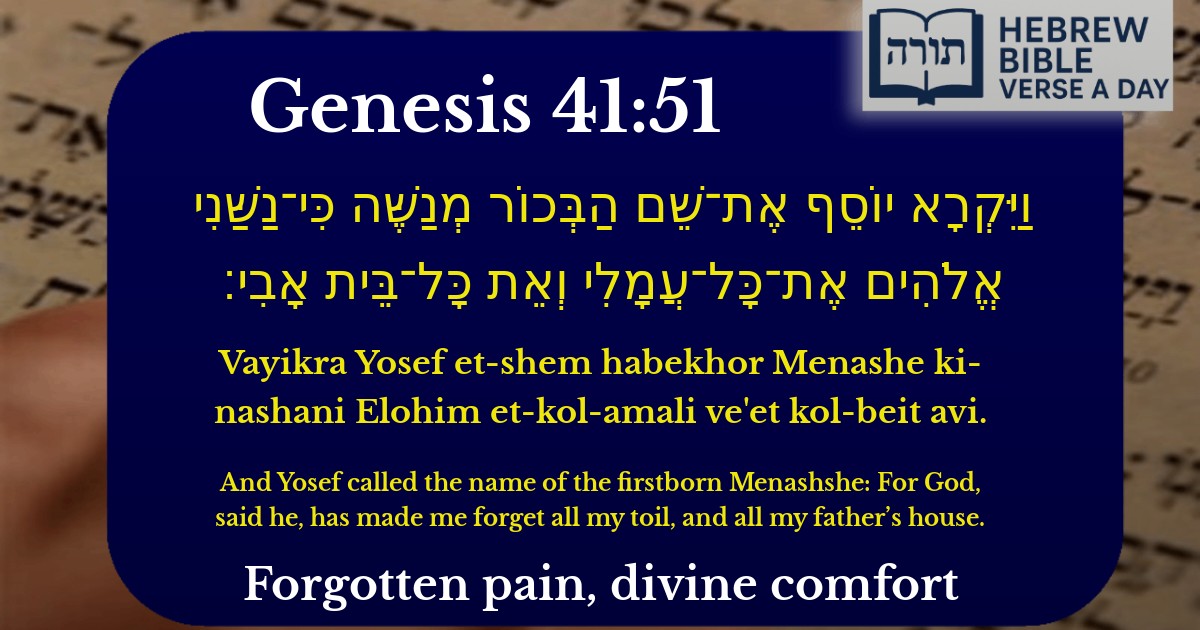Join Our Newsletter To Be Informed When New Videos Are Posted
Join the thousands of fellow Studends who rely on our videos to learn how to read the bible in Hebrew for free!
Hebrew Text
וַיִּקְרָא יוֹסֵף אֶת־שֵׁם הַבְּכוֹר מְנַשֶּׁה כִּי־נַשַּׁנִי אֱלֹהִים אֶת־כָּל־עֲמָלִי וְאֵת כָּל־בֵּית אָבִי׃
English Translation
And Yosef called the name of the firstborn Menashshe: For God, said he, has made me forget all my toil, and all my father’s house.
Transliteration
Vayikra Yosef et-shem habekhor Menashe ki-nashani Elohim et-kol-amali ve'et kol-beit avi.
Hebrew Leining Text
וַיִּקְרָ֥א יוֹסֵ֛ף אֶת־שֵׁ֥ם הַבְּכ֖וֹר מְנַשֶּׁ֑ה כִּֽי־נַשַּׁ֤נִי אֱלֹהִים֙ אֶת־כׇּל־עֲמָלִ֔י וְאֵ֖ת כׇּל־בֵּ֥ית אָבִֽי׃
וַיִּקְרָ֥א יוֹסֵ֛ף אֶת־שֵׁ֥ם הַבְּכ֖וֹר מְנַשֶּׁ֑ה כִּֽי־נַשַּׁ֤נִי אֱלֹהִים֙ אֶת־כׇּל־עֲמָלִ֔י וְאֵ֖ת כׇּל־בֵּ֥ית אָבִֽי׃
🎵 Listen to leining
Parasha Commentary
📚 Talmud Citations
This verse is quoted in the Talmud.
📖 Berakhot 7b
The verse is referenced in a discussion about the names given by biblical figures and their significance, particularly how names reflect divine interactions and personal experiences.
📖 Sotah 36b
The verse is cited in the context of discussing Yosef's (Joseph's) experiences in Egypt and his acknowledgment of God's role in his life, illustrating themes of divine providence and gratitude.


The Naming of Menashe
The verse states: "And Yosef called the name of the firstborn Menashe: For God, said he, has made me forget all my toil, and all my father’s house." (Bereishit 41:51). This naming reflects Yosef's emotional and spiritual state after enduring years of hardship in Egypt.
Rashi's Explanation
Rashi explains that the name Menashe (מְנַשֶּׁה) is derived from the root נ-שׁ-ה, meaning "to forget." Yosef acknowledges that Hashem enabled him to forget the suffering he endured—both the pain of being sold into slavery by his brothers and the anguish of separation from his father's household. However, Rashi clarifies that Yosef did not literally forget his family, but rather, the emotional distress associated with those memories was eased.
Rambam's Perspective on Divine Providence
Rambam (Hilchot De'ot 2:3) teaches that recognizing Hashem's hand in one's life leads to emotional and spiritual healing. Yosef's naming of Menashe demonstrates his deep faith—he attributes his ability to move forward not to his own resilience but to divine intervention. This aligns with the principle of hashgacha pratit (individual divine providence), where Yosef sees his suffering as part of a greater divine plan.
Midrashic Insights
The Dual Meaning of "Forgetting"
The Malbim explains that Yosef's "forgetting" was not mere erasure of memory but a transformation of perspective. By recognizing that his suffering had a higher purpose—saving nations from famine and reuniting with his family—Yosef could reinterpret his pain as part of Hashem's plan. Thus, Menashe's name symbolizes both relief from anguish and the wisdom to see divine providence in hardship.
Practical Lesson in Emunah
This verse teaches a profound lesson in emunah (faith). Yosef's ability to name his son in gratitude—despite his past suffering—demonstrates that true faith involves acknowledging Hashem's role in both hardship and redemption. As the Talmud (Berachot 60b) states, one should bless Hashem for the bad just as one blesses Him for the good, recognizing that all is for an ultimate purpose.